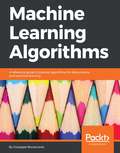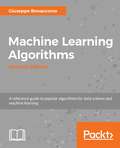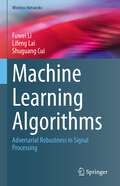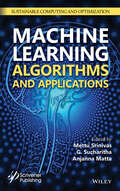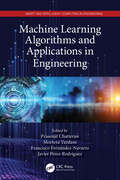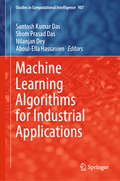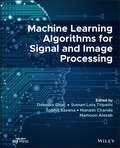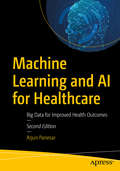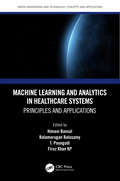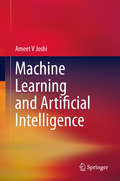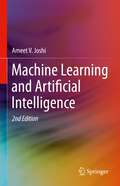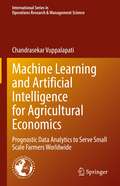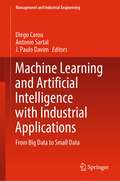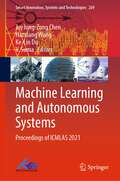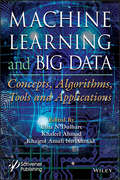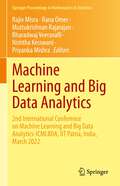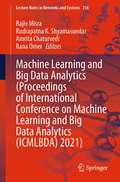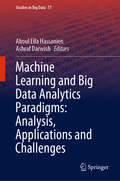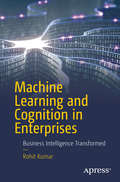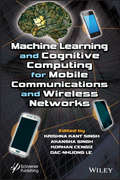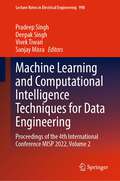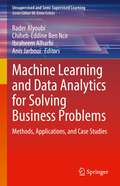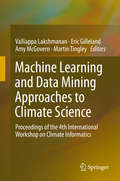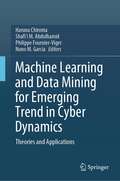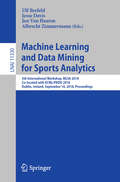- Table View
- List View
Machine Learning Algorithms: Popular Algorithms For Data Science And Machine Learning, 2nd Edition
by Giuseppe BonaccorsoBuild strong foundation for entering the world of Machine Learning and data science with the help of this comprehensive guide About This Book • Get started in the field of Machine Learning with the help of this solid, concept-rich, yet highly practical guide. • Your one-stop solution for everything that matters in mastering the whats and whys of Machine Learning algorithms and their implementation. • Get a solid foundation for your entry into Machine Learning by strengthening your roots (algorithms) with this comprehensive guide. Who This Book Is For This book is for IT professionals who want to enter the field of data science and are very new to Machine Learning. Familiarity with languages such as R and Python will be invaluable here. What You Will Learn • Acquaint yourself with important elements of Machine Learning • Understand the feature selection and feature engineering process • Assess performance and error trade-offs for Linear Regression • Build a data model and understand how it works by using different types of algorithm • Learn to tune the parameters of Support Vector machines • Implement clusters to a dataset • Explore the concept of Natural Processing Language and Recommendation Systems • Create a ML architecture from scratch. In Detail As the amount of data continues to grow at an almost incomprehensible rate, being able to understand and process data is becoming a key differentiator for competitive organizations. Machine learning applications are everywhere, from self-driving cars, spam detection, document search, and trading strategies, to speech recognition. This makes machine learning well-suited to the present-day era of Big Data and Data Science. The main challenge is how to transform data into actionable knowledge. In this book you will learn all the important Machine Learning algorithms that are commonly used in the field of data science. These algorithms can be used for supervised as well as unsupervised learning, reinforcement learning, and semi-supervised learning. A few famous algorithms that are covered in this book are Linear regression, Logistic Regression, SVM, Naive Bayes, K-Means, Random Forest, TensorFlow, and Feature engineering. In this book you will also learn how these algorithms work and their practical implementation to resolve your problems. This book will also introduce you to the Natural Processing Language and Recommendation systems, which help you run multiple algorithms simultaneously. On completion of the book you will have mastered selecting Machine Learning algorithms for clustering, classification, or regression based on for your problem. Style and approach An easy-to-follow, step-by-step guide that will help you get to grips with real -world applications of Algorithms for Machine Learning.
Machine Learning Algorithms: Popular algorithms for data science and machine learning, 2nd Edition
by Giuseppe BonaccorsoAn easy-to-follow, step-by-step guide for getting to grips with the real-world application of machine learning algorithmsKey FeaturesExplore statistics and complex mathematics for data-intensive applicationsDiscover new developments in EM algorithm, PCA, and bayesian regressionStudy patterns and make predictions across various datasetsBook DescriptionMachine learning has gained tremendous popularity for its powerful and fast predictions with large datasets. However, the true forces behind its powerful output are the complex algorithms involving substantial statistical analysis that churn large datasets and generate substantial insight.This second edition of Machine Learning Algorithms walks you through prominent development outcomes that have taken place relating to machine learning algorithms, which constitute major contributions to the machine learning process and help you to strengthen and master statistical interpretation across the areas of supervised, semi-supervised, and reinforcement learning. Once the core concepts of an algorithm have been covered, you’ll explore real-world examples based on the most diffused libraries, such as scikit-learn, NLTK, TensorFlow, and Keras. You will discover new topics such as principal component analysis (PCA), independent component analysis (ICA), Bayesian regression, discriminant analysis, advanced clustering, and gaussian mixture.By the end of this book, you will have studied machine learning algorithms and be able to put them into production to make your machine learning applications more innovative.What you will learnStudy feature selection and the feature engineering processAssess performance and error trade-offs for linear regressionBuild a data model and understand how it works by using different types of algorithmLearn to tune the parameters of Support Vector Machines (SVM)Explore the concept of natural language processing (NLP) and recommendation systemsCreate a machine learning architecture from scratchWho this book is forMachine Learning Algorithms is for you if you are a machine learning engineer, data engineer, or junior data scientist who wants to advance in the field of predictive analytics and machine learning. Familiarity with R and Python will be an added advantage for getting the best from this book.
Machine Learning Algorithms: Adversarial Robustness in Signal Processing (Wireless Networks)
by Fuwei Li Lifeng Lai Shuguang CuiThis book demonstrates the optimal adversarial attacks against several important signal processing algorithms. Through presenting the optimal attacks in wireless sensor networks, array signal processing, principal component analysis, etc, the authors reveal the robustness of the signal processing algorithms against adversarial attacks. Since data quality is crucial in signal processing, the adversary that can poison the data will be a significant threat to signal processing. Therefore, it is necessary and urgent to investigate the behavior of machine learning algorithms in signal processing under adversarial attacks. The authors in this book mainly examine the adversarial robustness of three commonly used machine learning algorithms in signal processing respectively: linear regression, LASSO-based feature selection, and principal component analysis (PCA). As to linear regression, the authors derive the optimal poisoning data sample and the optimal feature modifications, and also demonstrate the effectiveness of the attack against a wireless distributed learning system. The authors further extend the linear regression to LASSO-based feature selection and study the best strategy to mislead the learning system to select the wrong features. The authors find the optimal attack strategy by solving a bi-level optimization problem and also illustrate how this attack influences array signal processing and weather data analysis. In the end, the authors consider the adversarial robustness of the subspace learning problem. The authors examine the optimal modification strategy under the energy constraints to delude the PCA-based subspace learning algorithm. This book targets researchers working in machine learning, electronic information, and information theory as well as advanced-level students studying these subjects. R&D engineers who are working in machine learning, adversarial machine learning, robust machine learning, and technical consultants working on the security and robustness of machine learning are likely to purchase this book as a reference guide.
Machine Learning Algorithms and Applications
by Prasenjit Chatterjee Mettu Srinivas G. Sucharitha Anjanna MattaMachine Learning Algorithms is for current and ambitious machine learning specialists looking to implement solutions to real-world machine learning problems. It talks entirely about the various applications of machine and deep learning techniques, with each chapter dealing with a novel approach of machine learning architecture for a specific application, and then compares the results with previous algorithms. The book discusses many methods based in different fields, including statistics, pattern recognition, neural networks, artificial intelligence, sentiment analysis, control, and data mining, in order to present a unified treatment of machine learning problems and solutions. All learning algorithms are explained so that the user can easily move from the equations in the book to a computer program.
Machine Learning Algorithms and Applications in Engineering: Future Trends And Research Directions (Smart and Intelligent Computing in Engineering)
by Prasenjit Chatterjee Morteza Yazdani Francisco Fernández-Navarro Javier Pérez-RodríguezMachine Learning (ML) is a sub field of artificial intelligence that uses soft computing and algorithms to enable computers to learn on their own and identify patterns in observed data, build models that explain the world, and predict things without having explicit pre-programmed rules and models. This book discusses various applications of ML in engineering fields and the use of ML algorithms in solving challenging engineering problems ranging from biomedical, transport, supply chain and logistics, to manufacturing and industrial. Through numerous case studies, it will assist researchers and practitioners in selecting the correct options and strategies for managing organizational tasks.
Machine Learning Algorithms for Industrial Applications (Studies in Computational Intelligence #907)
by Santosh Kumar Das Shom Prasad Das Nilanjan Dey Aboul-Ella HassanienThis book explores several problems and their solutions regarding data analysis and prediction for industrial applications. Machine learning is a prominent topic in modern industries: its influence can be felt in many aspects of everyday life, as the world rapidly embraces big data and data analytics. Accordingly, there is a pressing need for novel and innovative algorithms to help us find effective solutions in industrial application areas such as media, healthcare, travel, finance, and retail. In all of these areas, data is the crucial parameter, and the main key to unlocking the value of industry. The book presents a range of intelligent algorithms that can be used to filter useful information in the above-mentioned application areas and efficiently solve particular problems. Its main objective is to raise awareness for this important field among students, researchers, and industrial practitioners.
Machine Learning Algorithms for Signal and Image Processing
by Deepika Ghai Suman Lata Tripathi Sobhit Saxena Manash Chanda Mamoun AlazabMachine Learning Algorithms for Signal and Image Processing Enables readers to understand the fundamental concepts of machine and deep learning techniques with interactive, real-life applications within signal and image processing Machine Learning Algorithms for Signal and Image Processing aids the reader in designing and developing real-world applications using advances in machine learning to aid and enhance speech signal processing, image processing, computer vision, biomedical signal processing, adaptive filtering, and text processing. It includes signal processing techniques applied for pre-processing, feature extraction, source separation, or data decompositions to achieve machine learning tasks. Written by well-qualified authors and contributed to by a team of experts within the field, the work covers a wide range of important topics, such as: Speech recognition, image reconstruction, object classification and detection, and text processing Healthcare monitoring, biomedical systems, and green energy How various machine and deep learning techniques can improve accuracy, precision rate recall rate, and processing time Real applications and examples, including smart sign language recognition, fake news detection in social media, structural damage prediction, and epileptic seizure detection Professionals within the field of signal and image processing seeking to adapt their work further will find immense value in this easy-to-understand yet extremely comprehensive reference work. It is also a worthy resource for students and researchers in related fields who are looking to thoroughly understand the historical and recent developments that have been made in the field.
Machine Learning and AI for Healthcare: Big Data for Improved Health Outcomes
by Arjun PanesarThis updated second edition offers a guided tour of machine learning algorithms and architecture design. It provides real-world applications of intelligent systems in healthcare and covers the challenges of managing big data.The book has been updated with the latest research in massive data, machine learning, and AI ethics. It covers new topics in managing the complexities of massive data, and provides examples of complex machine learning models. Updated case studies from global healthcare providers showcase the use of big data and AI in the fight against chronic and novel diseases, including COVID-19. The ethical implications of digital healthcare, analytics, and the future of AI in population health management are explored. You will learn how to create a machine learning model, evaluate its performance, and operationalize its outcomes within your organization. Case studies from leading healthcare providers cover scaling global digital services. Techniques are presented to evaluate the efficacy, suitability, and efficiency of AI machine learning applications through case studies and best practice, including the Internet of Things.You will understand how machine learning can be used to develop health intelligence–with the aim of improving patient health, population health, and facilitating significant care-payer cost savings.What You Will LearnUnderstand key machine learning algorithms and their use and implementation within healthcareImplement machine learning systems, such as speech recognition and enhanced deep learning/AIManage the complexities of massive dataBe familiar with AI and healthcare best practices, feedback loops, and intelligent agentsWho This Book Is ForHealth care professionals interested in how machine learning can be used to develop health intelligence – with the aim of improving patient health, population health and facilitating significant care-payer cost savings.
Machine Learning and Analytics in Healthcare Systems: Principles and Applications (Green Engineering and Technology)
by Himani Bansal, Balamurugan Balusamy, T. Poongodi, and Firoz Khan KPThis book provides applications of machine learning in healthcare systems and seeks to close the gap between engineering and medicine. It will combine the design and problem-solving skills of engineering with health sciences, in order to advance healthcare treatment. The book will include areas such as diagnosis, monitoring, and therapy. The book will provide real-world case studies, gives a detailed exploration of applications in healthcare systems, offers multiple perspectives on a variety of disciplines, while also letting the reader know how to avoid some of the consequences of old methods with data sharing. The book can be used as a reference for practitioners, researchers and for students at basic and intermediary levels in Computer Science, Electronics and Communications.
Machine Learning and Artificial Intelligence
by Ameet V JoshiThis book provides comprehensive coverage of combined Artificial Intelligence (AI) and Machine Learning (ML) theory and applications. Rather than looking at the field from only a theoretical or only a practical perspective, this book unifies both perspectives to give holistic understanding. The first part introduces the concepts of AI and ML and their origin and current state. The second and third parts delve into conceptual and theoretic aspects of static and dynamic ML techniques. The forth part describes the practical applications where presented techniques can be applied. The fifth part introduces the user to some of the implementation strategies for solving real life ML problems. The book is appropriate for students in graduate and upper undergraduate courses in addition to researchers and professionals. It makes minimal use of mathematics to make the topics more intuitive and accessible.Presents a full reference to artificial intelligence and machine learning techniques - in theory and application;Provides a guide to AI and ML with minimal use of mathematics to make the topics more intuitive and accessible;Connects all ML and AI techniques to applications and introduces implementations.
Machine Learning and Artificial Intelligence
by Ameet V JoshiThe new edition of this popular professional book on artificial intelligence (ML) and machine learning (ML) has been revised for classroom or training use. The new edition provides comprehensive coverage of combined AI and ML theory and applications. Rather than looking at the field from only a theoretical or only a practical perspective, this book unifies both perspectives to give holistic understanding. The first part introduces the concepts of AI and ML and their origin and current state. The second and third parts delve into conceptual and theoretic aspects of static and dynamic ML techniques. The fourth part describes the practical applications where presented techniques can be applied. The fifth part introduces the user to some of the implementation strategies for solving real life ML problems. Each chapter is accompanied with a set of exercises that will help the reader / student to apply the learnings from the chapter to a real-life problem. Completion of these exercises will help the reader / student to solidify the concepts learned. The book is appropriate for students in graduate and upper undergraduate courses in addition to researchers and professionals. It makes minimal use of mathematics to make the topics more intuitive and accessible. The book covers a large gamut of topics in the area of AI and ML and a professor can tailor a course on AI / ML based on the book by selecting and re-organizing the sequence of chapters to suit the needs.
Machine Learning and Artificial Intelligence for Agricultural Economics: Prognostic Data Analytics to Serve Small Scale Farmers Worldwide (International Series in Operations Research & Management Science #314)
by Chandrasekar VuppalapatiThis book discusses machine learning and artificial intelligence (AI) for agricultural economics. It is written with a view towards bringing the benefits of advanced analytics and prognostics capabilities to small scale farmers worldwide. This volume provides data science and software engineering teams with the skills and tools to fully utilize economic models to develop the software capabilities necessary for creating lifesaving applications. The book introduces essential agricultural economic concepts from the perspective of full-scale software development with the emphasis on creating niche blue ocean products. Chapters detail several agricultural economic and AI reference architectures with a focus on data integration, algorithm development, regression, prognostics model development and mathematical optimization. Upgrading traditional AI software development paradigms to function in dynamic agricultural and economic markets, this volume will be of great use to researchers and students in agricultural economics, data science, engineering, and machine learning as well as engineers and industry professionals in the public and private sectors.
Machine Learning and Artificial Intelligence with Industrial Applications: From Big Data to Small Data (Management and Industrial Engineering)
by Diego Carou Antonio Sartal J. Paulo DavimThis book presents the tools used in machine learning (ML) and the benefits of using such tools in facilities. It focus on real life business applications, explaining the most popular algorithms easily and clearly without the use of calculus or matrix/vector algebra. Replete with case studies, this book provides a working knowledge of ML current and future capabilities and the impact it will have on every business. It demonstrates that it is also possible to carry out successful ML and AI projects in any manufacturing plant, even without fully fulfilling the five V (Volume, Velocity, Variety, Veracity and Value) usually associated with big data. This book takes a closer look at how AI and ML are also able to work for industrial area, as well as how you could adapt some of the standard tips and techniques (usually for big data) for your own needs in your SME. Organizations which first understand these tools and know how to use them will benefit at the expense of their rivals.
Machine Learning and Autonomous Systems: Proceedings of ICMLAS 2021 (Smart Innovation, Systems and Technologies #269)
by Ke-Lin Du Joy Iong-Zong Chen Haoxiang Wang V. SumaThis book involves a collection of selected papers presented at International Conference on Machine Learning and Autonomous Systems (ICMLAS 2021), held in Tamil Nadu, India, during 24–25 September 2021. It includes novel and innovative work from experts, practitioners, scientists and decision-makers from academia and industry. It covers selected papers in the area of emerging modern mobile robotic systems and intelligent information systems and autonomous systems in agriculture, health care, education, military and industries.
Machine Learning and Big Data: Concepts, Algorithms, Tools and Applications
by Uma N. Dulhare Khaleel Ahmad Khairol Amali Bin AhmadCurrently many different application areas for Big Data (BD) and Machine Learning (ML) are being explored. These promising application areas for BD/ML are the social sites, search engines, multimedia sharing sites, various stock exchange sites, online gaming, online survey sites and various news sites, and so on. To date, various use-cases for this application area are being researched and developed. Software applications are already being published and used in various settings from education and training to discover useful hidden patterns and other information like customer choices and market trends that can help organizations make more informed and customer-oriented business decisions. Combining BD with ML will provide powerful, largely unexplored application areas that will revolutionize practice in Videos Surveillance, Social Media Services, Email Spam and Malware Filtering, Online Fraud Detection, and so on. It is very important to continuously monitor and understand these effects from safety and societal point of view. Hence, the main purpose of this book is for researchers, software developers and practitioners, academicians and students to showcase novel use-cases and applications, present empirical research results from user-centered qualitative and quantitative experiments of these new applications, and facilitate a discussion forum to explore the latest trends in big data and machine learning by providing algorithms which can be trained to perform interdisciplinary techniques such as statistics, linear algebra, and optimization and also create automated systems that can sift through large volumes of data at high speed to make predictions or decisions without human intervention
Machine Learning and Big Data Analytics: 2nd International Conference on Machine Learning and Big Data Analytics-ICMLBDA, IIT Patna, India, March 2022 (Springer Proceedings in Mathematics & Statistics #401)
by Rajiv Misra Rana Omer Muttukrishnan Rajarajan Bharadwaj Veeravalli Nishtha Kesswani Priyanka MishraThis edited volume on machine learning and big data analytics (Proceedings of ICMLBDA 2022) is intended to be used as a reference book for researchers and professionals to share their research and reports of new technologies and applications in Machine Learning and Big Data Analytics like biometric Recognition Systems, medical diagnosis, industries, telecommunications, AI Petri Nets Model-Based Diagnosis, gaming, stock trading, Intelligent Aerospace Systems, robot control, law, remote sensing and scientific discovery agents and multiagent systems; and natural language and Web intelligence. The intent of this book is to provide awareness of algorithms used for machine learning and big data in the advanced Scientific Technologies, provide a correlation of multidisciplinary areas and become a point of great interest for Data Scientists, systems architects, developers, new researchers and graduate level students. This volume provides cutting-edge research from around the globe on this field. Current status, trends, future directions, opportunities, etc. are discussed, making it friendly for beginners and young researchers.
Machine Learning and Big Data Analytics (Lecture Notes in Networks and Systems #256)
by Rajiv Misra Rudrapatna K. Shyamasundar Amrita Chaturvedi Rana OmerThis edited volume on machine learning and big data analytics (Proceedings of ICMLBDA 2021) is intended to be used as a reference book for researchers and practitioners in the disciplines of computer science, electronics and telecommunication, information science, and electrical engineering. Machine learning and Big data analytics represent a key ingredients in the industrial applications for new products and services. Big data analytics applies machine learning for predictions by examining large and varied data sets—i.e., big data—to uncover hidden patterns, unknown correlations, market trends, customer preferences, and other useful information that can help organizations make more informed business decisions.
Machine Learning and Big Data Analytics Paradigms: Analysis, Applications and Challenges (Studies in Big Data #77)
by Aboul Ella Hassanien Ashraf DarwishThis book is intended to present the state of the art in research on machine learning and big data analytics. The accepted chapters covered many themes including artificial intelligence and data mining applications, machine learning and applications, deep learning technology for big data analytics, and modeling, simulation, and security with big data. It is a valuable resource for researchers in the area of big data analytics and its applications.
Machine Learning and Cognition in Enterprises
by Rohit KumarLearn about the emergence and evolution of IT in the enterprise, see how machine learning is transforming business intelligence, and discover various cognitive artificial intelligence solutions that complement and extend machine learning. In this book, author Rohit Kumar explores the challenges when these concepts intersect in IT systems by presenting detailed descriptions and business scenarios. He starts with the basics of how artificial intelligence started and how cognitive computing developed out of it. He'll explain every aspect of machine learning in detail, the reasons for changing business models to adopt it, and why your business needs it. Along the way you'll become comfortable with the intricacies of natural language processing, predictive analytics, and cognitive computing. Each technique is covered in detail so you can confidently integrate it into your enterprise as it is needed. This practical guide gives you a roadmap for transformin g your business with cognitive computing, giving you the ability to work confidently in an ever-changing enterprise environment. What You'll Learn See the history of AI and how machine learning and cognitive computing evolved Discover why cognitive computing is so important and why your business needs it Master the details of modern AI as it applies to enterprises Map the path ahead in terms of your IT-business integration Avoid common road blocks in the process of adopting cognitive computing in your business Who This Book Is For Business managers and leadership teams.
Machine Learning and Cognitive Computing for Mobile Communications and Wireless Networks
by Dac-Nhuong Le Krishna Kant Singh Korhan Cengiz Akansha SinghCommunication and network technology has witnessed recent rapid development and numerous information services and applications have been developed globally. These technologies have high impact on society and the way people are leading their lives. The advancement in technology has undoubtedly improved the quality of service and user experience yet a lot needs to be still done. Some areas that still need improvement include seamless wide-area coverage, high-capacity hot-spots, low-power massive-connections, low-latency and high-reliability and so on. Thus, it is highly desirable to develop smart technologies for communication to improve the overall services and management of wireless communication. Machine learning and cognitive computing have converged to give some groundbreaking solutions for smart machines. With these two technologies coming together, the machines can acquire the ability to reason similar to the human brain. The research area of machine learning and cognitive computing cover many fields like psychology, biology, signal processing, physics, information theory, mathematics, and statistics that can be used effectively for topology management. Therefore, the utilization of machine learning techniques like data analytics and cognitive power will lead to better performance of communication and wireless systems.
Machine Learning and Computational Intelligence Techniques for Data Engineering: Proceedings of the 4th International Conference MISP 2022, Volume 2 (Lecture Notes in Electrical Engineering #998)
by Pradeep Singh Deepak Singh Vivek Tiwari Sanjay MisraThis book comprises the proceedings of the 4th International Conference on Machine Intelligence and Signal Processing (MISP2022). The contents of this book focus on research advancements in machine intelligence, signal processing, and applications. The book covers the real-time challenges involved while processing big data analytics and stream processing with the integration of smart data computing services and interconnectivity. It also includes the progress in signal processing to process the normal and abnormal categories of real-world signals such as signals generated from IoT devices, smart systems, speech, videos and involves biomedical signal processing: electrocardiogram (ECG), electroencephalogram (EEG), magnetoencephalography (MEG), electromyogram (EMG), etc. This book proves to be a valuable resource for those in academia and industry.
Machine Learning and Data Analytics for Solving Business Problems: Methods, Applications, and Case Studies (Unsupervised and Semi-Supervised Learning)
by Bader Alyoubi Chiheb-Eddine Ben Ncir Ibraheem Alharbi Anis JarbouiThis book presents advances in business computing and data analytics by discussing recent and innovative machine learning methods that have been designed to support decision-making processes. These methods form the theoretical foundations of intelligent management systems, which allows for companies to understand the market environment, to improve the analysis of customer needs, to propose creative personalization of contents, and to design more effective business strategies, products, and services. This book gives an overview of recent methods – such as blockchain, big data, artificial intelligence, and cloud computing – so readers can rapidly explore them and their applications to solve common business challenges. The book aims to empower readers to leverage and develop creative supervised and unsupervised methods to solve business decision-making problems.
Machine Learning and Data Mining Approaches to Climate Science
by Valliappa Lakshmanan Eric Gilleland Amy Mcgovern Martin TingleyThis book presents innovative work in Climate Informatics, a new field that reflects the application of data mining methods to climate science, and shows where this new and fast growing field is headed. Given its interdisciplinary nature, Climate Informatics offers insights, tools and methods that are increasingly needed in order to understand the climate system, an aspect which in turn has become crucial because of the threat of climate change. There has been a veritable explosion in the amount of data produced by satellites, environmental sensors and climate models that monitor, measure and forecast the earth system. In order to meaningfully pursue knowledge discovery on the basis of such voluminous and diverse datasets, it is necessary to apply machine learning methods, and Climate Informatics lies at the intersection of machine learning and climate science. This book grew out of the fourth workshop on Climate Informatics held in Boulder, Colorado in Sep. 2014.
Machine Learning and Data Mining for Emerging Trend in Cyber Dynamics: Theories and Applications
by Philippe Fournier-Viger Nuno M. Garcia Haruna Chiroma Shafi’i M. AbdulhamidThis book addresses theories and empirical procedures for the application of machine learning and data mining to solve problems in cyber dynamics. It explains the fundamentals of cyber dynamics, and presents how these resilient algorithms, strategies, techniques can be used for the development of the cyberspace environment such as: cloud computing services;cyber security; data analytics; and,disruptive technologies like blockchain. The book presents new machine learning and data mining approaches in solving problems in cyber dynamics. Basic concepts, related work reviews, illustrations, empirical results and tables are integrated in each chapter to enable the reader to fully understand the concepts, methodology, and the results presented. The book contains empirical solutions of problems in cyber dynamics ready for industrial applications. The book will be an excellent starting point for postgraduate students and researchers because each chapter is design to have future research directions.
Machine Learning and Data Mining for Sports Analytics: 5th International Workshop, MLSA 2018, Co-located with ECML/PKDD 2018, Dublin, Ireland, September 10, 2018, Proceedings (Lecture Notes in Computer Science #11330)
by Ulf Brefeld Jesse Davis Jan Van Haaren Albrecht ZimmermannThis book constitutes the refereed post-conference proceedings of the 5th International Workshop on Machine Learning and Data Mining for Sports Analytics, MLSA 2018, colocated with ECML/PKDD 2018, in Dublin, Ireland, in September 2018.The 12 full papers presented together with 4 challenge papers were carefully reviewed and selected from 24 submissions. The papers present a variety of topics, covering the team sports American football, basketball, ice hockey, and soccer, as well as the individual sports cycling and martial arts. In addition, four challenge papers are included, reporting on how to predict pass receivers in soccer.
